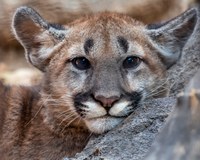ABQ BioPark Helps A Number of Species this Fall
Whether it be at home or abroad, the ABQ BioPark strives to make a difference for endangered animal populations. This fall, we had several successes on the conservation front. Learn more below and get acquainted with our varied conservation initiatives here.
Baby Ocelots
The ABQ BioPark contributed to conservation of the ocelot, a North America and New Mexico-native species, by welcoming two healthy kittens from mom Lucy and dad Dale. Ocelots are native to the Americas, with populations from the Southwest United States into much of northern South America. The ocelot is listed as an endangered species by the US Fish and Wildlife Service, and is thus protected by the Endangered Species Act. According to the service, populations can be found in south Texas and southeast Arizona. Learn more about the new kittens.
Rescued Mountain Lion
The Zoo took in an orphaned mountain lion cub, found in Nebraska. This continues the BioPark's legacy of taking in rescue mountain lions. The mountain lion--also known as cougar, puma, panther and catamount--is native to the Americas from Canada south to Argentina. Cougar populations are on the decline, and hunting is prohibited across much of its range in Latin America and Canada as well as California. The US Fish and Wildlife Service has also listed one sub-species, the Florida panther, as endangered and protected by the Endangered Species Act. Learn more about Larabee.
Abidjan Trip
The ABQ BioPark returned to the Ivory Coast this October to continue its partnership to help save the critically endangered West African slender-snouted crocodile. More information on the 2019 trip is forthcoming. In the meantime, read about the history of the project here.
Rio Grande Silver Minnow Release
ABQ BioPark staff recently released 15,000 Rio Grande silvery minnows into the river. This continues a 19-year tradition of contribution to the survival of this New Mexico native fish. The ABQ BioPark's Aquatic Conservation Facility, which rears several species of New Mexico native fish, partners with the Middle Rio Grande Endangered Species Collaborative Program. Over the years, the ABQ BioPark has helped release more than 800,000 silvery minnows. Learn more about this year's release.
Mexican Gray Wolves
The ABQ BioPark also temporarily holds injured wild wolves who need medical treatment and/or rehabilitation. Such was the case for two wolves received by the Zoo this November. The two came from separate wild packs in Arizona and New Mexico and had both fallen victim to leg hold traps. Although one had to have a leg amputated due to the severity of its injury, both are expected to return to their wild packs after a little more care and rehabilitation from BioPark staff.

